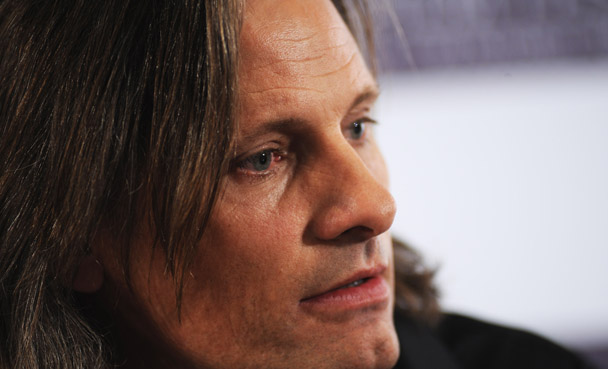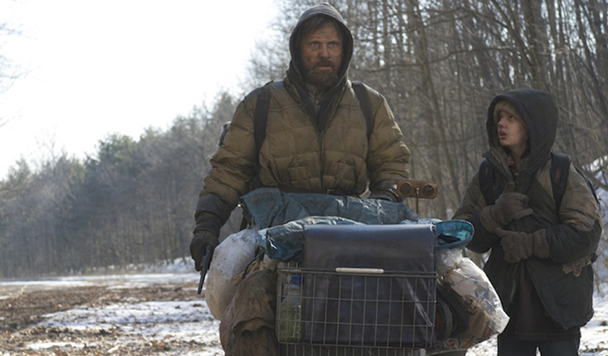Viggo Mortensen
The actor on becoming the man, film adaptations and, his latest film, The Road.
Since his breakthrough role as Aragorn in The Lord of the Rings trilogy, Viggo Mortensen has chosen his roles well with A History of Violence and Eastern Promises being the most acclaimed of the films on that list. With The Road, Mortensen takes on his most challenging role to date. He talked to Pure Movies about his preparation, film adaptations and becoming the Man.
Viggo, how did you feel about getting this part – a part you must have known from reading the book?
VM: Well I had read all of McCarthy’s books except The Road and, even though No Country For Old Men was more well known, I think that The Road is his most far reaching, universally appealing work, because it’s more ‘straight ahead’, more easily understood. I thought it was a great script, and I realised it was quite an honour to be offered this role. It’s one of those books that you can’t put down – if you’ve read it you’ll know what I mean – and I think the adaptation does that justice. And the adaptation only became better the closer we got to shooting, it became more fine tuned as we went along. I think – including The Lord of The Rings and anything else that I’ve been in or seen – I think that it’s probably the most faithful, not just in spirit but in letter, adaptation of any book. It really is just like the book.
What was it like working with Kodi?
For one thing as an actor, you’re only as good as who you’re with; first of all, the landscape was so real, so gritty, so truthful, that you had to live up to that and your behaviour had to match that, you couldn’t hide at all, emotionally. I was worried about the Boy when I got cast. I mean this Boy in the book just kills you, breaks your heart. How were they going to find that boy? And luckily they did. Kodi Smit-McPhee is an extraordinary individual, in the measure of not just his talent, but his humanity; he was able to be joyful everyday at work, like a kid, and then he could just focus and deliver what his character required, the sorrow, the doubt, the fear, and then just that native happiness he has. I like the dynamic between the father and son, because the boy doesn’t know anything of the world it was, it’s only what I tell him or show him in picture-books, you know, animals, birds, trees, flowers – all that.
Did it help being a father in real life?
VM: Yeah, to a degree I think, John also being a father, having a son, helped – it was a helpful ‘way in’ initially, but I think you don’t have to be a parent to understand this story I don’t think. It really came down to being quite naked from the inside, very honest you know. It had to be that way or it wouldn’t work. And I couldn’t have done it had I not had my partner in Kodi, who pulled certain things out of me and I would return it. I think that that complicity, that relationship that was forged through hardship also having a good time, frankly, you feel that on screen. The journey, as hard as it is, has to be that difficult to earn what happens at the end, which I think is strangely uplifting and quite beautiful. I think you’d have to be quite obstructed, internally, when you see this movie not to be moved by it.
Like the character says in voiceover, if I were God, I would make the world just so, and I think that any story has a chance at inspiring you to feel that this life, no matter how complicated it is, this world, no matter how messed up it is, is good and beautiful in some way, that it’s worthwhile, that you wouldn’t trade it for another even if you could, that story’s done it’s job, and I think that this movie’s done that.
Can you tell me a little about the process of becoming the character of the Man, did you have to lose weight and get into the character that way?
VM: Well there was a big feed before we did the flashbacks with Charlize (Theron), where I went out and made a complete swine of myself which was nice, but also because I wanted to seem somewhat healthier than I had been for the previous months. Spring had arrived also, everything was quite different. But also, there were certain things, externally, obviously I couldn’t look extremely well fed so I lost some weight, ate less, was more careful about what I ate. But after a certain point it was more a leap of faith for everyone involved, and I think that’s why I like working in the movies and I like going to the movies, because there a movies, old and new, where there are close-ups, or the composition of a certain wide-shot, that’s beyond technical explanation, no matter how technologically advanced movie-making had become. Having Kodi as well, took me to another place; there are shots I see – as great as the make-up department and the costume designers are – there is something beyond that that creates shots that just exceeded anything I could have hoped to have created.
As far as preparation, it was much less than any other character I’ve done, with the external. Yes I listened to certain types of music, I watched certain types of movies, yes I lost some weight, yes John showed me some movies that he thought the look of would have a beneficial effect on us, and also read certain types of literature – things that get you in a mood. But it was much less about the externals, I knew it would have to come from the inside, about revealing yourself. I think all these other things helped, but I guess what it was truly about was all of us being brave enough to just let it all hang out and hope that it would work, and to be satisfied that we’d given it our all. In my case as an actor, it was mostly with this boy and having to be completely exposed in a way that drew from the inside, more so than in any other job that I’ve ever experienced.
Why are you so fascinated with McCarthy’s writing?
VM: Mostly his prose, his descriptions. The dialogue is quite spare, understandably, and then when you transfer it to a visual medium, even more so it becomes about the unspoken, the reactions, that are emotional, reactions to extraordinary events – reactions to difficult experiences. I like his prose descriptions in the book a lot, I love his book, Blood Meridian, I know it served John as inspiration for The Proposition; his descriptions in that book, like in The Road, they just stop you cold sometimes, you just have to put the book down every now and again. He’s a real poet.
You mentioned The Lord of The Rings earlier, both films share this huge, mythical landscape, this whole other wordliness, can you compare the projects in terms of what the experience was like, especially in terms of the emotional and physical baggage each project brought you, and can you compare the two experiences?
VM: Well you can, The Lord of The Rings – that was a whole other story, but the crew had the book, just like with The Road, while we shot the scenes. It was the same sort of feel, when you have a crew that is that into the book, the story, it lifts you, it makes you braver, you know, you could feel that on The Lord of The Rings as well. As much as there were emotional moments in The Lord of The Rings, this is much leaner, obviously, but on some level it’s more consistently truthful in terms of human nature, it’s just a different type of story. There was definitely a family feeling on both of the projects.











COMMENTS